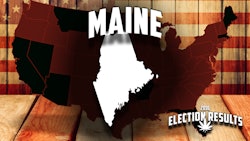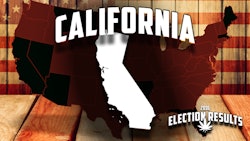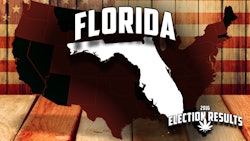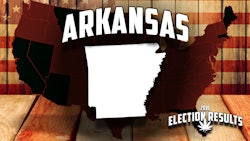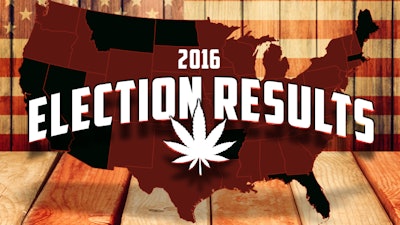
By Noelle Skodzinski
November 2016 has been a landmark year in the fight to end marijuana prohibition across the United States. On Nov. 8, voters in California, Massachusetts, Maine and Nevada showed their support for legalizing marijuana for recreational use, while voters in Arkansas, Florida, Montana and North Dakota voted in favor of medical marijuana initiatives. (Links to full stories on each state below.)
Only Arizona’s adult use/recreational measure was voted down by the state’s residents.
Eight states have now legalized marijuana for adult use and the establishment of marketplaces that treat marijuana like alcohol. Voters in Colorado and Washington legalized recreational marijuana in 2012, and Oregon and Alaska voted to legalize it in 2014. Twenty-one states have removed criminal penalties for certain marijuana possession offenses, according to NORML.
And 35 states and the District of Columbia now have legal medical marijuana programs of some type; (29 states and D.C. have more extensive medical marijuana programs, while 15 states have CBD-only programs which allow for low- or no-THC content, and may or may not allow for cultivation and sales of high-CBD content marijuana), according to Cannabis Business Times reporting.
“This is the most momentous Election Day in history for the movement to end marijuana prohibition,” said Rob Kampia, executive director of the Marijuana Policy Project, in a statement. “From Los Angeles to Boston, voters are casting their ballots in favor of sensible marijuana policy reforms. Today’s results are right in line with national polls showing record-high support for making marijuana legal.
“These votes send a clear message to federal officials that it's time to stop arresting and incarcerating marijuana users," Kampia said. "Congress must take action to ease the tension between state and federal marijuana laws. Once this new batch of state laws takes effect over the next couple of months, marijuana will be legal in more than half a dozen states, and we expect several more to follow during the 2017-2018 legislative and election cycles. The end of prohibition is near, and it would be a mistake for the federal government to continue waging war on its own nonviolent citizens. How do you ask a DEA agent to be the last man to enforce a mistake?
“Most voters do not think otherwise law-abiding citizens should be criminalized for using a product that is much safer than alcohol. They want marijuana to be sold inside regulated, taxpaying businesses, not on the streets, where sales enrich cartels and drug dealers. There is a general consensus that law enforcement should be fighting serious crimes rather than enforcing failed and deeply unpopular policies,” he said.
“The overwhelming support of voters in California, Massachusetts, Nevada and Maine reinforces the will of the people to overturn prohibition,” said Mark Malone, executive director of the Cannabis Business Alliance, in a statement. “Sensibly regulating cannabis takes it out of the black market and turns it into an economic driver. We are pleased to see these states following Colorado’s lead, and we look forward to seeing the cannabis industry prosper and continue to be a job creator."
The legal marijuana market is projected to reach $7.1 billion this year, according to the recently released 4th edition of the "State of Legal Marijuana Markets" report by Arcview Market Research and New Frontier, according to a Forbes article. The report also stated that the legal marijuana market increased from $4.6 billion in 2014 to $5.7 billion in 2015.
The Trump Effect
Many have wondered what would happen to the industry once a new President takes office. So, what does the election of Donald Trump, who beat rival Hillary Clinton 276 electoral votes to 218, as the new President-elect mean for marijuana law reform and states where marijuana is currently legal, whether for medical or recreational purposes?
Trump “has been shaky about his stance on the plant,” reported Cannabis Business Times in July. “According to OnTheIssues.org, Trump was a proponent of federal legalization of illicit drugs, saying, ‘you have to take the profit away from these drug czars.’”
During his presidential campaign, Trump shifted toward medical marijuana legalization, but also suggested he believes in state's rights.
“'In terms of marijuana and legalization, I think that should be a state issue, state-by-state,' Trump said at a rally in Nevada last year,” according to the Cannabis Business Times report. And in a Washington Post report, he said, “Marijuana is such a big thing. I think medical should happen. And then I really believe we should leave it up to the states.”
Trump’s running mate, newly elected Vice President Mike Pence (Rep.), is currently governor of Indiana, which has “some of the toughest marijuana laws in the country. Possession under 30 grams (just over one ounce) is punishable by up to six months in prison and fines up to $5,000,” Cannabis Business Times reported.
Indiana has no medical cannabis program, and the Indiana General Assembly has made no effort to create one after making no progress on any proposed cannabis bill during the entire 2016 session, according to the Marijuana Policy Project.
“Pence has even actively worked against softening drug crimes in his state. In 2013, House Bill 1006, which in its original form would have reclassified cannabis possession as a Class C offense, was amended to a Class B offense, the second-highest possible misdemeanor charge, after Pence spoke at a news conference,” according to the Cannabis Business Times’ report. “‘I think we need to focus on reducing crime, not reducing penalties,’ Pence said at the press conference. But while he did allow some easing, the state also amended its minimum time served, increasing it from 50 percent to 75 percent, meaning cannabis offenders will spend roughly the same amount of time behind bars if convicted.”
Republicans now also control the Senate and House, and many fear a Republican Congress could pull the rug out from cannabis legalization in the United States. If Trump’s focus, however, is on building American businesses, wiping out what has been cited by the Huffington Post as the fastest-growing industry in the country may not make sense.
Republicans have been slower to support marijuana legalization in any form, but some Republicans have at least shown support for medical marijuana reform. For example, Sen. Rand Paul (R-KY) introduced with Sen. Cory Booker (D-NJ) the most comprehensive medical marijuana bill ever introduced in Congress, S. 683, the CARERS (Compassionate Access, Research Expansion and Respect States) Act, which would reclassify cannabis from a Schedule I to a Schedule II drug. The Act has 19 cosponsors, just three of whom are Republicans. The CARERS Act also was introduced in the House as H.R. 1538, according to govtrack.us and has 42 co-sponsors, of whom 14 are Republican.
According to the Pew Research Center, “Most Republicans (55%) oppose marijuana legalization, while 41% favor it.” Democrats favor legalization “by more than two-to-one … 66% vs. 30%,” Pew Reasarch reports.
The Democratic Party had endorsed a pathway toward legalization when it set its national platform on July 26.
State-by-State Coverage
View Cannabis Business Times coverage of the election outcome for each state with 2016 legalization ballot initiatives here:
Arizona
Arkansas
California
Florida
Maine
Massachusetts
Montana
Nevada
North Dakota










